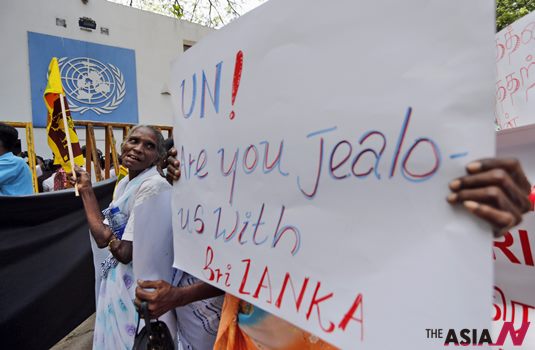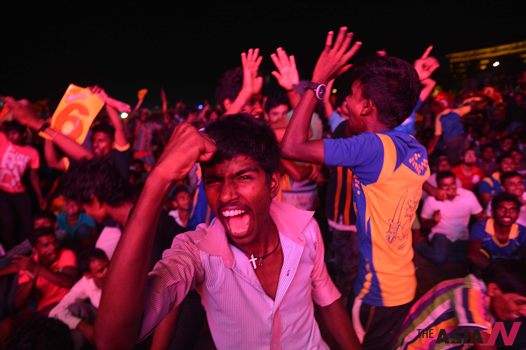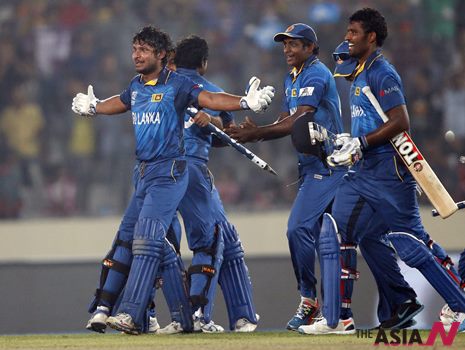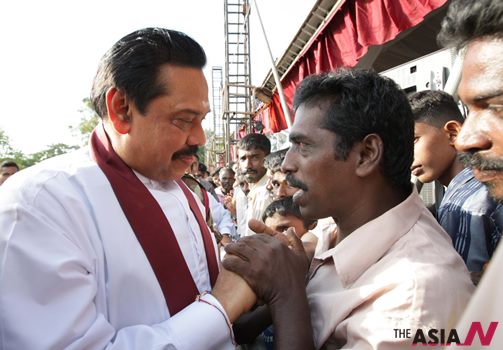Which is better path for reconciliation, cricket or UN?

Sri Lankan pro-government supporters protest outside the U.N. office in Colombo, Sri Lanka, Monday, March 10, 2014. Protesters staged a rally to oppose a proposed U.S. backed resolution against Sri Lanka?s human rights record which will be tabled at the United Nations Human Rights Council (UNHRC). (Photo : AP/NEWSis)
“In Sri Lanka, cricket is a better path to reconciliation than the UN plan”
Rejecting the resolution passed at the UN Human Rights Council (UNHRC) on March 27th to mount an ‘independent’ international investigation into alleged human rights violations in Sri Lanka, President Mahinda Rajapkase said that Sri Lanka would continue with its own reconciliation process that was started after the Liberation Tigers of Tamil Eelam (LTTE) was defeated in May 2009.
The resolution, which was adopted by 24 votes to 12 with 12 abstentions has been described by the government as a lop-sided vote where most of those voting for it were Europeans. “The EU votes as a block and the US had more than a dozen votes already in the bag, while we started with none”, Rajapakse pointed out during a meeting with foreign media representatives in Colombo.
Two days after the vote, posters appeared all over Colombo claiming a moral victory and questioning the mandate. It thanked the 24 nations that did not vote for the resolution including giant neighbour India. Government spokespeople have noted that these 24 nations were a better reflection of the international community.

ans of Sri Lanka celebrate in the street after their team won the ICC Twenty20 World Cup cricket final against India, in Colombo, capital of Sri Lanka, April 6, 2014. (Photo:Xinhua)
Sri Lankan cricketers committed to reconciliation
If there was any doubt about Sri Lanka’s commitment to reconciliation, it was the Sri Lankan cricketers that delivered a telling blow to UNHRC Head Navi Pillay and her supporters, who have claimed that Tamils and minorities are being marginalized in the country.
Just a week after the UNHRC vote, Sri Lanka’s cricket team won the T20 World Cup in Dhaka, which sent the cricket-crazy nation into a frenzy of celebrations. The ethnically mixed team is widely supported across the country and when the man of the match and retiring cricket legend Kumar Sangakara told a worldwide television audience at the presentation ceremony that they won the cup for 20 million Sri Lankans “each one of them” he emphasized, there was no doubt in the country that it is in fact the reality.
I watched the cricket’s final game at a hotel in Pasikudah in eastern Sri Lanka, an area that has been under LTTE rule for a few years. I watched it with 5 of the Tamil staff at the hotel, each of them cheering every Sri Lankan boundary and when the final victory was achieved over India, they spontaneously sang a Tamil celebratory song. Sinhalese for long believed that Tamils, particularly in the East and North of the country, supported India when it came to cricket. But what I was witnessing was a new Sri Lanka perhaps.
Next morning I listened to an interview on Sri Lankan radio where a senior military officer in the north, explained how they set up huge TV screens in the northern Tamil strongholds of Jaffna, Kiliinochi and Malaitivu, where thousands of Tamils gathered to watch the game and later celebrated along with the army officers when Sri Lanka won. Two days later I was driving past a well-known Muslim area near Wattala on my way to the airport, where men, women and children have lined up along the road waving Sri Lankan lion flags waiting for the motorcade of the returning cricketing heroes to arrive.
Spirit of tolerance, reconciliation and peace shown via cricket games
The Asian Tribune reported on April 13th that the US Secretary of State John Kerry has issued a New Year message to all Sri Lankans (who celebrated the New year on April 14th) saying that he hoped this New Year will bring a new opportunity for all Sri Lankans to join together in the spirit of tolerance, reconciliation, and peace.
Perhaps because the US does not play cricket, he was not aware of the celebrations just a week ago where such a spirit of tolerance, reconciliation and peace was evident.
What offends many Sri Lankans is the patronizing attitudes of Western nations and some UN officials, where they think they have the solutions to all the problems in the world. Even India found the latest UNHRC resolution too intrusive and refused to back it.
UN’s investigation of human rights beyond mandate
India’s Foreign Secretary Sujatha Singh was quoted in the media here as saying that what the UNHRC was trying to do on the Sri Lankan issue through the resolution adopted in Geneva was beyond its mandate. “It is not for the UN to investigate Sri Lanka and that India’s position has always been that it is a national prerogative to investigate human rights issues” she said.
Sri Lanka has welcomed India’s principled stand and President Rajapakse ordered the immediate release of 79 Indian fishermen that have been arrested by the Sri Lankan Navy for intruding into Sri Lankan fishing grounds in the north. The Navy has since stopped arresting the intruders from Tamil Nadu.
Lankaweb columnist Bandu de Silva argues that India’s vote switch in Geneva indicates that the Foreign Policy bureaucrats in New Delhi have been able to bring the Central Government back into reality “to pursue India’s long term interest of building up her image as a moral force in the world” rather than pandering to Tamil Nadu politicians for the short-term political need of staying in power.
On April 1st, the Sri Lankan government hit back at its Tamil diaspora opponents who have been instrumental in persuading Western governments to move the resolution against Sri Lanka. The government banned LTTE and 15 other LTTE fronts and named 424 individuals and organizations to be investigated for alleged links to terror. These entities are all operating from overseas with leaders having ties with foreign politicians and parliamentarians as well as tied to various charities and NGOs. Ironically, the banned entities are operating in countries, which have banned the LTTE and continue to maintain the ban.
Defence Ministry spokesman Brigadier Ruwan Wanigasooriya has told the Press Trust of India that among the organisations proscribed are the LTTE’s Trans National Government of Tamil Eelam (TGTE), Global Tamil Forum (GTF), which are active in Europe, and the UK-based British Tamil Forum (BTF). He has said that the government will urge the western governments to investigate their fundraising activities. The government will also alert Interpol about them.
Just before the Geneva vote, Sri Lankan government claimed that there is evidence of an attempt to revive the LTTE terrorism in the country. They disclosed to the media a shoot-out near the former LTTE stronghold of Killinichi, where a police officer is alleged to have been injured. They also reported on the discovery of a large catch of arms in the house the police have surrounded. They have allegedly traced the source of funding for these arms to a Tamil diaspora activist Nediyavan who lives in Norway.
“Tiger activists turned into human rights activists”
“Many of the tiger and pro-tiger activists abroad transformed themselves into human rights champions” notes veteran war reporter D.B.S Jeyaraj writing in his blog. “Ostensibly the name of the LTTE game was no longer an armed struggle to achieve national liberation. It was now a lofty quest for justice, accountability, reconciliation and equality”.
“A tragic-comic aspect of the changed scenario was the spectacle of accredited representatives from respected human rights organizations associating with yester-year tigers gloating in their new avatar. The battlefront had seemingly shifted to the UN Human Rights Council arena in the new venue of Geneva,” he noted.
On April 10th Sri Lankan authorities said that the army has killed the three gunmen who escaped during the shoot-out with the police, during another shoot-out in the North. They named all three of them as former LTTE combatants, who were rehabilitated after surrendering to the army in the final stages of the war, and released to the community.
On April 8th Sri Lankan Defense establishment also revealed that a senior LTTE leader known as Nanthagopan, who has been functioning as one of the two deputy leaders of the LTTE overseas network was apprehended in Iran on March 6th travelling on a forged passport to visit his family living in Germany, and he was subsequently sent back to Sri Lanka via Malaysia. Sri Lankan Defense officials are said to be elated by the capture of Nanthagopan as he is a key LTTE functionary with firsthand knowledge of current overseas LTTE operations.
Thus the Sri Lankan government is pointing out to its critics in the UNHRC and in the West that the army needs to be on alert in the former LTTE strongholds, and the western government needs to take action to stop their countries becoming havens for terrorist fundraising.
President Rajapakse ended war and opened new opportunities
Writing in the Colombo Telegraph, Melbourne-based Tamil physician Dr Noel Nadesan, who has visited Jaffna 13 times in the past 5 years and helped to set up a private health clinic in his homeland, argues that whether you like him or not, diaspora Tamils need to appreciate that President Rajapakse has ended a brutal war and opened up new opportunities for their people.
Rather than becoming overnight human rights champions, he appeals to fellow Tamil diaspora to help rebuild the communities in their homeland. “We have to recognise the gains of peace, if we are to move forward. Politics can cloud the issues and make us easily forget the bloody past” argues Dr. Nadesan, and referring to the LTTE holding 400,000 Tamils as human shields in the last days of the war, he adds, “taking cover behind unarmed civilians is a shameful act not worthy of our so-called heroes. It was a cowardly act”.
“Going back to confrontational politics can only lead us tortuously to political turmoil again” warns the Sri Lankan born Australian doctor, in an impassioned plea to his overseas Tamils (and perhaps the likes of Navi Pillay as well). “Our people cannot live on a diet of politics forever. We need economics to raise our heads from the depths of misery. We have to postpone politics for the time being”. By Dr. Kalinga Seneviratne in Colombo
Dr. Kalinga Seneviratne is a Sri Lanka-born journalist, media analyst and international communications lecturer based in Singapore.



























































